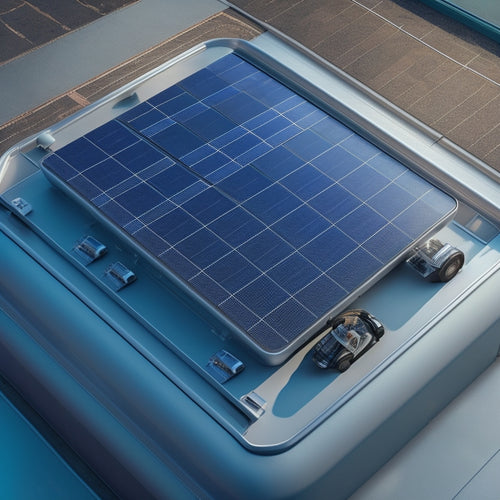Serve and Play: Integrating Solar Energy Into Sports Equipment
Share
You're about to experience a new era of sports equipment, where the power of the sun fuels your next adventure. Solar-powered sports gear is revolutionizing the industry, providing a sustainable solution for athletes on-the-go. With integrated solar cells, you can harness energy from the sun to charge devices, track performance, and enhance safety features. This innovative technology captures kinetic energy during physical activity, converting it into electrical energy. As you explore this new frontier, you'll discover how solar power integration is transforming the sports industry, and how you can be at the forefront of this eco-friendly movement. Stay ahead of the game – there's more to come.
Key Takeaways
• Solar-powered sports equipment enables athletes to extend adventure time, eliminating battery power concerns and promoting eco-friendly values.
• Advanced solar-powered sensors in sports gear track performance metrics in real-time, providing valuable insights into speed, distance, and acceleration.
• Solar-powered devices in sports equipment can track performance, enhance safety features, and provide real-time data, revolutionizing the sports industry.
• Sustainable manufacturing of solar-powered sports equipment reduces environmental impact by using eco-friendly materials, reducing waste, and conserving natural resources.
• The integration of solar energy into sports equipment is driving sustainable practices, transforming the sports industry, and promoting environmental stewardship.
Solar Power in Sports Gear
As you gear up for your next outdoor adventure, you'll be excited to learn that innovative manufacturers are integrating solar power into an array of sports equipment, from backpacks to bike helmets.
This integration is revolutionizing the way athletes perform and interact with their gear. One notable example is solar backpacks, which have become increasingly popular among outdoor enthusiasts.
These backpacks are equipped with thin, flexible solar panels that harness energy from the sun, allowing athletes to charge their devices on-the-go.
This innovation isn't only environmentally friendly but also enhances athlete branding, as athletes can showcase their commitment to sustainability.
Solar power integration also enables athletes to extend their adventure time, as they no longer need to worry about running out of battery power.
In addition, solar-powered sports gear provides a unique opportunity for athletes to promote eco-friendly values, aligning with the growing demand for sustainable products.
As manufacturers continue to push the boundaries of solar-powered sports equipment, athletes can expect to see even more innovative solutions that combine performance, sustainability, and style.
Enhancing Athlete Performance Metrics
With advanced solar-powered sensors integrated into sports gear, you can now track your performance metrics in real-time, gaining valuable insights into your speed, distance, and acceleration.
This data is essential in refining your technique, identifying areas of improvement, and optimizing your performance. Personalized coaching is now more effective, as coaches can analyze your biomechanical movements and provide tailored feedback to fine-tune your skills.
Biomechanical analysis is also enhanced with solar-powered sensors, allowing for a more detailed understanding of your movement patterns.
You can monitor your progress, set realistic goals, and adjust your training regimen accordingly. The accuracy and precision of these metrics enable you to make data-driven decisions, taking your performance to the next level.
Moreover, real-time feedback enables you to adjust your technique during a game or training session, allowing for immediate improvements.
Sustainable Materials in Manufacturing
You can now expect solar-powered sports equipment to be manufactured with sustainable materials that reduce environmental impact, as eco-friendly production processes become the new standard in the industry.
This shift towards sustainability is driven by the need to minimize waste and conserve natural resources.
As a result, manufacturers are turning to innovative materials that not only reduce environmental footprint but also provide improved performance and durability.
Biodegradable plastics, for instance, are replacing traditional plastics in the production of sports equipment.
These bioplastics are made from renewable resources such as corn starch, sugarcane, or potato starch, which can reduce carbon emissions by up to 70%.
Additionally, recycled textiles are being used to create high-performance fabrics that are both durable and sustainable.
These eco-friendly materials aren't only better for the environment but also provide improved comfort, flexibility, and moisture-wicking properties.
As the sports industry continues to adopt sustainable manufacturing practices, you can expect to see more innovative materials and production methods that prioritize the environment without compromising performance.
Energy Harvesting in Sports Equipment
As you venture into the world of sports, you're about to discover a game-changer.
Solar panels integrated into sports equipment, such as bicycles, golf bags, or athletic wear, can capture kinetic energy generated during physical activity, converting it into electrical energy to power devices, track performance, or enhance safety features.
This innovative approach to energy harvesting in sports equipment enables you to stay connected and perform at your best while reducing your carbon footprint.
Smart Sensors for Real-Time Data
Integrating smart sensors into sports equipment enables real-time data collection and analysis, allowing athletes to monitor their performance, track progress, and receive timely feedback to optimize their training.
As you wear or hold the equipment, the sensors track your movements, capturing data on speed, distance, and other performance metrics. This data is then transmitted wirelessly to your device or coach's dashboard, providing instant insights into your performance.
With advanced data analytics, you can identify areas for improvement, set goals, and track progress over time.
For instance, a tennis racket with embedded sensors can track your serve speed, spin, and accuracy, helping you refine your technique. Similarly, a smart basketball can analyze your shooting form, providing real-time feedback on your release angle and follow-through.
Solar-Powered Safety Features
As you explore solar-powered safety features in sports equipment, you'll notice a significant impact on two critical areas:
Illuminated safety gear and enhanced emergency response are the two areas that benefit from solar power.
You'll see how solar energy can power lights, reflectors, or other visibility aids to increase athlete safety, particularly in low-light conditions.
Additionally, you'll discover how solar-powered devices can quickly alert responders in emergency situations, ensuring prompt medical attention when it's needed most.
Illuminated Safety Gear
You can substantially enhance your visibility and safety during low-light outdoor activities by incorporating solar-powered illuminated safety gear into your sports equipment.
This innovative integration enables you to stay safe and visible even in the darkest environments.
For instance, glowing pathways can be integrated into your gear, providing a clear and visible route for you to follow during nighttime activities.
Additionally, reflective accents can be strategically placed on your equipment to reflect light and increase your visibility to others.
Solar-powered safety gear can also include features such as LED lights, which can be embedded into your clothing or accessories to provide an added layer of safety.
These lights can be programmed to flash or remain steady, depending on your specific needs.
In addition, solar-powered safety gear can be designed to be adaptable, allowing you to adjust the level of illumination according to your environment.
Enhanced Emergency Response
With solar-powered safety features, your sports equipment can automatically alert emergency responders in the event of an accident, thanks to built-in GPS and cellular connectivity that rapidly transmit your location and biometric signs.
This means that in the critical moments following an accident, you can rely on your gear to send out a distress signal, even if you're unable to call for help yourself.
In the event of a disaster, such as a natural disaster or a multi-casualty incident, your solar-powered safety features can seamlessly integrate with communication networks to facilitate a swift response.
This enables emergency responders to prioritize their efforts, allocating resources more efficiently and reducing response times.
Additionally, during disaster drills, these features can help simulate real-world scenarios, allowing responders to fine-tune their strategies and improve their response times.
The Future of Sustainable Sports
Your sports equipment will soon be powered by innovative solar energy solutions, revolutionizing the future of sustainable sports. As the sports industry shifts towards eco-friendliness, you can expect to see a significant increase in eco-friendly stadiums and sustainable sponsors. These changes will not only reduce the carbon footprint of sports events but also promote a healthier environment for athletes and spectators alike.
| Sustainable Initiative | Description |
|---|---|
| Eco-Friendly Stadiums | Designed with energy-efficient systems and renewable energy sources |
| Sustainable Sponsors | Partners that promote eco-friendly practices and reduce waste |
| Solar-Powered Equipment | Innovative gear that harnesses solar energy for enhanced performance |
| Green Sports Technology | Advanced solutions for reducing environmental impact in sports |
As the sports industry continues to evolve, you can expect to see a surge in innovative technologies that prioritize sustainability. With the integration of solar energy into sports equipment, the future of sustainable sports is looking brighter than ever. Get ready to experience the thrill of sports in a whole new way – one that's not only exciting but also environmentally friendly.
Integrating Solar Cells in Design
As you venture into the world of sustainable sports equipment, you'll notice designers are seamlessly incorporating solar cells into sports equipment by strategically placing photovoltaic panels on curved surfaces, enabling efficient energy harvesting.
This innovative approach allows for the integration of solar power without compromising the equipment's performance or aesthetic appeal.
When integrating solar cells into sports equipment, designers must consider aesthetic considerations, ensuring the panels blend seamlessly with the equipment's design.
This is achieved through the use of innovative textures and materials that not only enhance the equipment's appearance but also improve its functionality.
For instance, textured surfaces can increase the surface area of the solar panels, boosting energy output.
Greening the Sports Industry
The sports industry, traditionally a significant contributor to environmental degradation, is undergoing a transformative shift towards sustainability, driven in part by the integration of solar energy in sports equipment.
As you explore the intersection of sports and sustainability, you'll notice a growing focus on ecological innovations that reduce the industry's ecological footprint.
Environmental stewardship is becoming a core aspect of the sports industry's identity, and it's about time.
You're witnessing a sea change in the way sports equipment is designed, manufactured, and used.
The incorporation of solar energy is just one facet of a broader movement towards sustainable practices.
From eco-friendly materials to energy-harvesting technologies, the sports industry is embracing its role as a responsible steward of the environment.
As you explore further into the world of sustainable sports, you'll discover a community committed to minimizing waste, reducing emissions, and promoting environmentally conscious practices.
The future of sports is clearly green, and it's up to you to be a part of this transformative journey.
Frequently Asked Questions
Can Solar-Powered Sports Equipment Be Used in Low-Light Conditions?
When you're considering solar-powered sports equipment, you'll want to know: can it perform in low-light conditions? Fortunately, advanced Moonlight Performance technology guarantees reliable energy harvesting, even in twilight hours, maintaining Twilight Safety standards for peak user experience.
How Do Solar Panels Affect the Weight and Balance of Sports Gear?
When integrating solar panels into sports gear, you'll need to ponder material selection to minimize added weight and optimize aerodynamic implications, ensuring the equipment's balance and performance aren't compromised.
Are Solar-Powered Sports Equipment More Expensive Than Traditional Ones?
You'll find that solar-powered sports equipment typically comes with a premium pricing tag, making them more expensive than traditional ones due to the added cost of solar panels, resulting in a higher overall cost comparison.
Can Athletes Customize Their Solar-Powered Sports Equipment?
You can customize your solar-powered sports equipment to fit your personal preferences, choosing from various design options to optimize performance, comfort, and style, ensuring a tailored fit that enhances your game.
Do Solar-Powered Sports Equipment Require Special Maintenance?
You'll need to perform routine maintenance on your solar-powered gear, including weather resistance checks, battery calibration, and adhering to user manuals, to guarantee peak performance, and take advantage of warranty options and cleaning protocols for extended lifespan.
Related Posts
-

Top Solar Panels for Car Battery Maintenance
When selecting top solar panels for car battery maintenance, consider high-efficiency models with high wattage output...
-

Top 10 DIY Conversion Kit Reviews and Tips
You're taking the first step towards electrifying your ride, and with the right DIY conversion kit, you'll be cruisin...
-

Safely Staying on Course: 5 Essential Lane Tips
You're about to take your driving skills to the next level by mastering the art of staying in your lane. First, inves...


